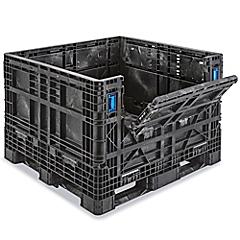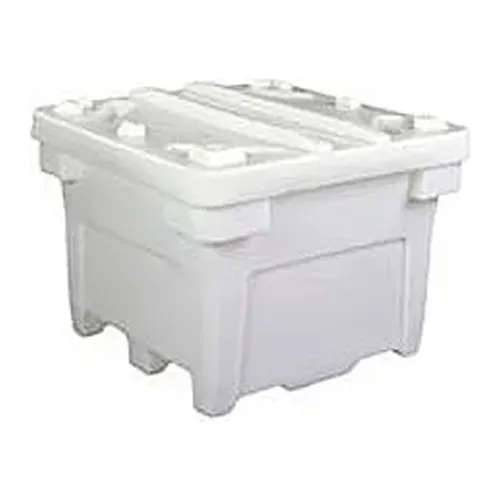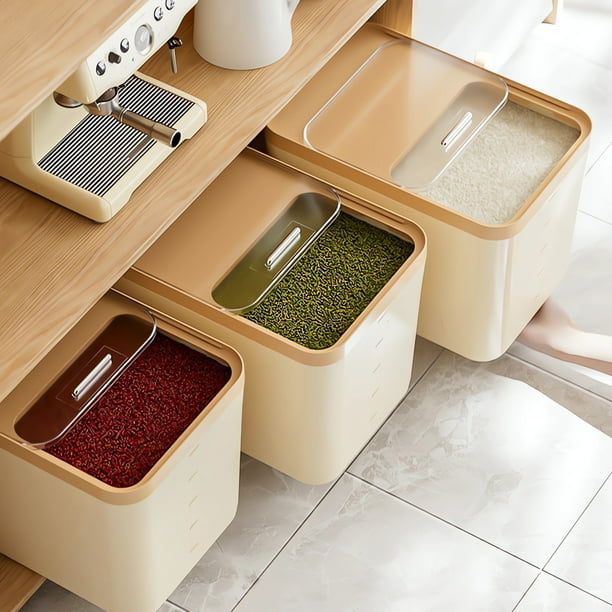Everything About Mass Plastic Containers: Benefits, Applications, and Industry Insights
Bulk plastic containers play a significant role in numerous sectors, using benefits that enhance efficiency and sustainability. Their light-weight nature decreases delivery expenses, while their longevity guarantees safe storage and transport of diverse products. As business increasingly seek eco-friendly services, the need for these containers is expanding. This elevates vital concerns concerning the materials made use of and the patterns affecting their style. What implications do these factors have for the future of mass plastic containers?
Benefits of Bulk Plastic Containers
Mass plastic containers use a wide variety of advantages in numerous markets. Their lightweight layout significantly reduces transport expenses, permitting reliable logistics and much easier handling. Furthermore, these containers give sturdiness and resistance to weather elements, chemicals, and physical effect, making certain the safe storage and transportation of goods. The versatility of bulk plastic containers enables them to be molded right into different shapes and sizes, catering to details market needs.

Common Applications Across Industries
While various industries utilize bulk plastic containers, their applications are particularly noticeable in fields such as food and drink, pharmaceuticals, agriculture, and production. In the food and drink market, these containers are important for storing and carrying products like grains, fluids, and ready meals, guaranteeing freshness and safety and security. The pharmaceutical field counts on mass plastic containers for safe storage of vaccines and drugs, preserving compliance with rigorous guidelines.
In farming, these containers facilitate reliable handling and transport of fruit and vegetables, fertilizers, and chemicals, while also sustaining sustainable methods through recyclability. Production markets make use of bulk plastic containers for parts storage and production line procedures, promoting company and workflow performance. Additionally, these containers offer a substantial role in logistics and supply chain monitoring, simplifying the activity of goods throughout various industries. In general, the flexibility of bulk plastic containers makes them vital across numerous markets.
Product and Style Considerations
When choosing mass plastic containers, material and layout factors to consider play a necessary function in ensuring capability and conformity with sector requirements. The selection of product significantly impacts the container's resilience, weight ability, and resistance to ecological aspects. Common products include high-density polyethylene (HDPE) and polypropylene, understood for their strength and chemical resistance.
Layout elements, such as dimension, closure, and form mechanisms, likewise affect functionality. Containers with ergonomic handles and stackable styles boost storage space performance and ease of transport. Additionally, attributes like airing vent or water drainage openings may be essential for details applications, enabling air blood circulation or fluid removal.
Compliance with security laws, such as FDA approvals for food-grade applications, is important. bulk plastic containers for sale. Overall, careful factor to consider of materials and layout can maximize efficiency and long life, making certain that mass plastic containers fulfill the varied demands of numerous sectors properly
Patterns in Bulk Plastic Container Usage
As industries develop, the usage of mass plastic containers is increasingly influenced by sustainability and performance. Firms are opting for environment-friendly materials, such as recycled plastics, to minimize environmental impact while keeping longevity. This change is driven by customer need for sustainable practices and regulatory stress aimed at reducing plastic waste.
Moreover, the trend toward automation in logistics and supply chain management is reshaping container styles. Mass containers are now being engineered for compatibility with automated systems, boosting operational efficiency. Lightweight styles are also acquiring read the article traction, as they decrease shipping costs and power intake during transportation.
Furthermore, customization is becoming a centerpiece, allowing organizations to tailor containers to specific requirements, thereby optimizing room and functionality. These fads reflect a broader dedication to sustainability, advancement, and efficiency within different sectors, guaranteeing that mass plastic containers remain to play an essential role in modern-day supply chains.
Best Practices for Storage Space and Transportation
Reliable storage space and transportation of mass plastic containers require adherence to ideal practices that improve security and performance. Containers must be piled securely, guaranteeing that weight is evenly distributed to stop tipping or damages. Utilizing pallets can help with much easier activity and protect the containers from ground wetness. Furthermore, appropriate labeling is necessary for quick identification and tracking throughout transportation.
Temperature control is another crucial element; extremes can jeopardize the stability of the materials. When essential, it is recommended to store containers in a climate-controlled environment. For transportation, selecting suitable cars designed for bulk loads guarantees security and decreases threat throughout transit.
Regular inspections of containers before storage space and transport help identify any kind of wear or damages, permitting timely upkeep or substitute. By adhering to these best practices, organizations can optimize the lifecycle of bulk plastic containers while maintaining functional efficiency.
Regularly Asked Concerns

Are Bulk Plastic Containers Recyclable After Use?
Yes, bulk plastic containers are usually recyclable after usage. Nonetheless, recyclability relies on the product kind and regional recycling programs. Appropriate cleansing and sorting are necessary to ensure they are approved by recycling centers.

What Is the Lifespan of Bulk Plastic Containers?
The life expectancy of bulk plastic containers commonly ranges from 5 to 10 years, relying on use conditions, material quality, and environmental aspects. plastic bulk containers. Proper maintenance can prolong their durability, making them a resilient storage space solution
Can Bulk Plastic Containers Be Custom-made?
Yes, bulk plastic containers can be personalized. Suppliers typically supply choices for size, branding, shade, and product, allowing services to customize containers to their specific requirements and improve their item presentation and performance.
How Do Mass Plastic Containers Compare in Cost to Alternatives?
Mass plastic containers usually use a reduced expense contrasted to choices like metal or glass, due to their lightweight nature and toughness. This makes them a cost-effective choice for companies needing efficient storage space options.
Are There Security Laws for Utilizing Mass Plastic Containers?

Mass plastic containers play a substantial function in various markets, providing advantages that boost efficiency and sustainability. While various sectors utilize bulk plastic containers, their applications are especially prominent in markets such as food and beverage, drugs, farming, and manufacturing. Production markets utilize bulk plastic containers for components storage space and assembly line procedures, advertising organization and workflow performance. When choosing mass from this source plastic containers, material and layout considerations play a vital function in guaranteeing functionality and compliance with market standards. As sectors evolve, the use of bulk plastic containers is increasingly affected by sustainability and effectiveness.